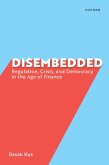Almost all advanced democracies have launched significant privatization programs over the last three decades. However, while there was a global run into privatization, substantial cross-national differences in the divesture of state-owned enterprises can be observed. This book focuses on the political economy of privatization, and addresses the questions 'What are the driving forces behind this development and how can the variation be explained?' which are of both theoretical and empirical interest. While the topic itself is not new, the existing comparative literature on the political economy of privatization suffers from at least two major shortcomings: First, recent macro-quantitative analysis in political science and economics has only focused on material privatization; formal privatization has hitherto been neglected due to an absence of data, even though this type of privatization is of eminent relevance in the public utility sectors. Second, most of the empirical studies in this area treat countries as independent units. In reality, however, policy decisions are likely to be interdependent. Policy decisions taken in one country influence the decision-making process in others. Given these shortcomings in the existing literature, the idea of this volume is to supply a fresh and comprehensive overview of the political economy of privatization using a new data set, the REST database. The empirical analysis covers 20 OECD countries in the period between 1980 and the advent of the global economic crisis in 2008. The recent economic crisis provides a good opportunity to take stock of the changing role of government in economic over the last three decades.
Dieser Download kann aus rechtlichen Gründen nur mit Rechnungsadresse in A, B, BG, CY, CZ, D, DK, EW, E, FIN, F, GR, HR, H, IRL, I, LT, L, LR, M, NL, PL, P, R, S, SLO, SK ausgeliefert werden.









